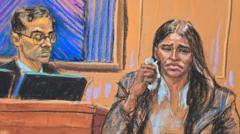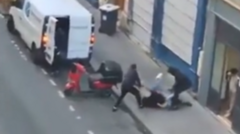Han Tae-soon, a mother who lost her daughter Kyung-ha in 1975, is suing the South Korean government, alleging systemic failures in its overseas adoption program that led to her daughter's illegal adoption. Their reunion after 44 years has uncovered a painful history of kidnapping and human trafficking within South Korea's adoption practices.
Mother Sues South Korea After Reuniting with Daughter Abducted 44 Years Ago

Mother Sues South Korea After Reuniting with Daughter Abducted 44 Years Ago
A landmark case questions the South Korean government's role in illegal adoptions as a mother fights for justice after decades of searching for her child.
Han Tae-soon has spent decades searching for her daughter, Kyung-ha, who vanished from their home in Seoul in 1975. That fateful day, after asking Kyung-ha to join her on a trip to the market, Han returned to find her daughter missing. It would take over 44 years for the two to reunite, and when they did, Kyung-ha was an almost unrecognizable middle-aged American woman named Laurie Bender.
Their reunion brought bittersweet closure to a traumatic past. Han alleges that Kyung-ha was abducted by a stranger and subsequently adopted illegally in the U.S. This has become part of Han’s case against the South Korean government for enabling such practices through its lack of oversight in the country's overseas adoption program. Since its inception in the mid-20th century, the program has been marred by accusations of kidnapping and human trafficking, with approximately 170,000 to 200,000 children adopted abroad, primarily through private agencies.
A recent inquiry into South Korea’s adoption history revealed systematic human rights violations, allowing the “mass export” of children for profit without proper safeguards. Han’s lawsuit, which is set to go to court next month, seeks accountability from a government that has long been silent on these emotional injustices.
Reflecting on her search, Han, now 71, expressed the emotional toll it took on her: "I spent 44 years ruining my body and mind searching for [my daughter]. Not once has anyone ever apologised to me." Over the decades, she had followed leads, posted flyers, and made public appeals, hoping against hope to reunite with Kyung-ha.
The reunion finally materialized in 2019 when Han joined a group that uses DNA matching to connect overseas Korean adoptees with their birth parents. A match was found with Laurie Bender, whose recollections are starkly different from the memories Han carries of her daughter. Kyung-ha had been taken from her neighborhood by a woman claiming to know her mother, relinquished to an orphanage, and placed on a plane to the U.S., given false documents that misrepresented her as an abandoned orphan.
"This is like living a fake life. Everything is not true," Kyung-ha lamented during a previous interview. Their case highlights a broader issue within South Korea's adoption practices, which some describe as a form of child trafficking that followed the devastation of the Korean War. While the government initially presented the program as a humanitarian effort, it has faced criticism for allowing private agencies to operate without stringent regulation, leading to numerous allegations of fraud and coercion.
Experts emphasize that the responsibility lies not only with private adoption agencies but also with the state itself for enabling and profiting from these practices. Critics assert the adoption policies were geared toward strengthening international relationships rather than genuinely prioritizing the welfare of the children involved.
Despite recent government attempts to reform the adoption system, the emotional scars remain for many family members like Han Tae-soon, who continue to suffer from the trauma of separation. As adoptees and birth parents navigate the complexities stemming from decades of mismanagement, the path toward reconciliation remains fraught with difficulty. Han, who now practices English daily to communicate better with her daughter, poignantly stated, "No amount of money will ever make up for what I've lost."



















